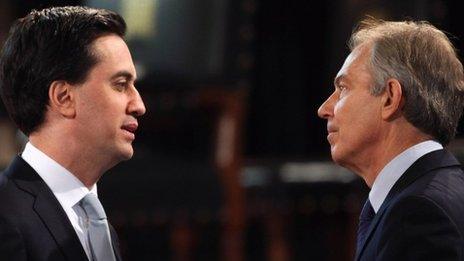Tony Blair says EU vote plan would cause economic chaos
- Published
Tony Blair on David Cameron's EU vote promise: 'Think of the chaos'
Ex-Labour PM Tony Blair has warned that David Cameron's pledge to hold a referendum on Britain's EU membership would cause economic "chaos".
Mr Blair said Mr Cameron had put "exit on the agenda" by pledging a vote and that leaving would threaten the UK's position as a "great global nation".
But Mr Cameron said his predecessor was "ignoring the will of the people".
Mr Blair, who was in his old Sedgefield constituency, also gave current Labour leader Ed Miliband his "100%" support.
Mr Blair won general elections as Labour leader in 1997, 2001 and 2005, and stood down as prime minister in 2007.
BBC deputy political editor James Landale said Mr Blair had "largely stayed out of British politics" since then - but Labour hoped he still had "enough lingering stardust to appeal to some voters".
In other election developments on Tuesday:
The Conservatives said they would give the NHS whatever funding it needs amid a row with Labour over GP appointments
The Tories released figures suggesting the last Labour government raised taxes on earnings by an average of nearly £1,900 per household. Labour said the figures were "made up"
Nick Clegg set out how the Lib Dems would use the proceeds from a crackdown on tax evasion to fund income tax cuts
David Cameron is campaigning in Scotland, Wales, Northern Ireland and England in a single day
Nigel Farage said UKIP would create a veterans minister and launch a national defence medal
The Green Party said a pledge of a £72 a week "citizens' income" for every British adult will be in its manifesto but will take more than five years to introduce
Research for BBC Scotland suggested voters in Scotland favour targeted public spending ahead of efforts to eliminate the deficit or cut taxes
Mr Cameron has pledged to renegotiate a "better deal" for the UK in Europe and to stage a referendum on the UK's membership in 2017.
But speaking in his former constituency of Sedgefield in County Durham, Mr Blair said a referendum would be a "huge distraction" and the prospect of possible exit would leave a "pall of unpredictability hanging over the British economy".
"And the oddest thing of all about having this referendum? The PM doesn't really believe we should leave Europe; not even the Europe as it is today," he said.
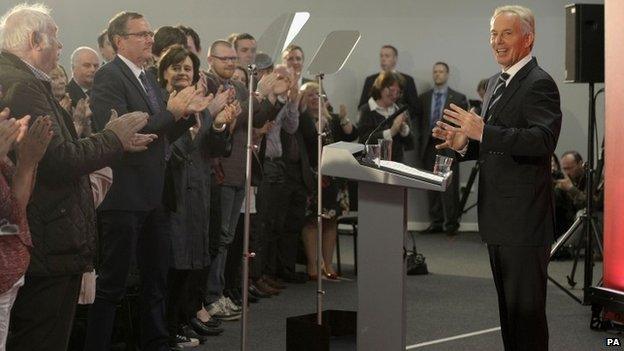
Mr Blair said Mr Miliband was "his own man"
"This was a concession to party, a manoeuvre to access some of the UKIP vote, a sop to the rampant anti-Europe feeling of parts of the media.
"This issue, touching as it does the country's future, is too important to be traded like this."
'No credibility'
Mr Blair said leaving the EU would leave Britain "diminished in the world" and take the country "out of the leadership game" globally.
Citing the wrangling over Scottish devolution and the growth of the SNP since September's referendum on Scottish independence, Mr Blair said it was foolish to believe an EU referendum would settle the issue once and for all.
Mr Blair, who has appeared to question some of Mr Miliband's positioning in the past year, said he "respected" the Labour leader for putting the "interests of the country first" and opposing a referendum on Conservative terms.
"He showed on this, as he did on other issues, that he is his own man with his own convictions and the determination to follow them even when they go against the tide."

Analysis by political editor Nick Robinson
Not so long ago I invited Tony Blair to say that Ed Miliband was a strong leader.
He side-stepped the question - choosing instead to say that it was up to voters to decide.
So, should we take what he has said today with a massive pinch of pre-election salt? The answer, I believe, is no.

Asked whether he agreed with Mr Miliband's views on the economy, regarded to be to the left of his, Mr Blair said Labour was united by a "deep and profound belief in social justice" and he believed its leader had an "excellent set of policies" to deal with the challenges facing Britain.
"I have always had a view that Ed can win and I hope and I am sure he will... I support him 100% to lead our party to victory at the next general election."
Labour has made its opposition to a referendum a key plank of its appeal to the business community, although firms have warned that although a referendum will cause uncertainty, the EU needs structural reform and the status quo is not acceptable.
Asked about his predecessor's intervention, Mr Miliband said it was "quite important that we've got a former prime minister saying about the current prime minister that what he's doing is dangerous for the country because he is making Britain drift towards the exit door".
The Conservatives have responded by saying Mr Blair has "no credibility" over the EU, suggesting that he "gave away" part of the UK's rebate on its contributions to the EU when he was in Downing Street.
'Minimum required'
Speaking in Belfast, Mr Cameron said he wanted the UK to remain within a "reformed" EU, with powers "coming back to Britain".
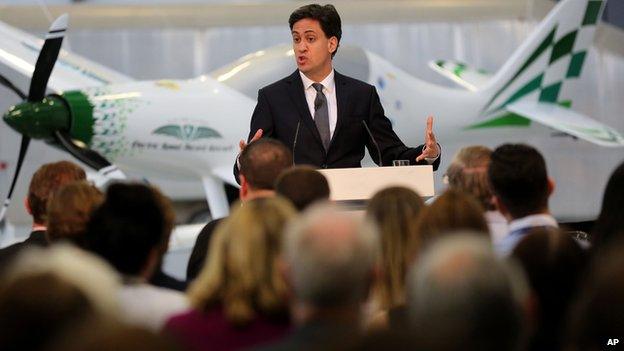
Mr Miliband has said a referendum would cause unnecessary instability
"Tony Blair and Ed Miliband don't think we should trust the people and I completely disagree.
"I think the British people deserve a say about Europe. You can't stay in an organisation unless it has the full-hearted consent of the people and that is why it is right to have a referendum."
Speaking on BBC Radio 4's PM, Conservative Chief Whip Michael Gove said aside from Mr Blair's endorsement of Mr Miliband's stance on the EU, the former PM's silence on other issues "spoke volumes".
He added: "Tony Blair, I think, has limited credibility on this issue because he was one of those who argued passionately for our entry into the single currency and I don't think there's any respectable politician now who would want to waste their breath arguing that we should enter the euro."
Mr Cameron, who is visiting all four nations of the UK on Tuesday, earlier appealed in a newspaper interview, external to supporters of UKIP - which wants to leave the EU - to "come home" to the Conservatives.
'Hokey-cokey'
UKIP, which is pushing for a referendum on Europe as early as the end of 2015, has rejected Mr Cameron's entreaties and welcomed Mr Blair's intervention as a chance to have a "proper debate" about the UK's place in Europe.
"It is no surprise to see him pat Ed Miliband on the back for signing up to the corporatist EU agenda," its leader Nigel Farage said.
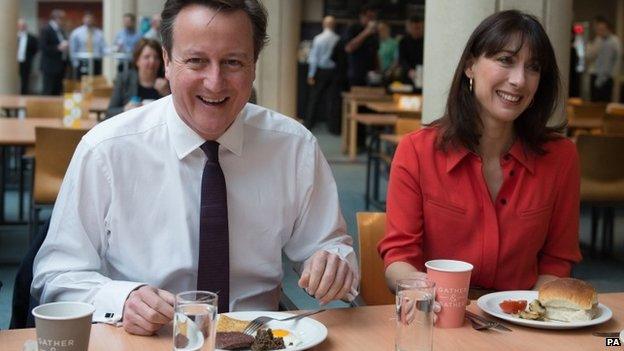
David Cameron and his wife Samantha started the day with breakfast in Edinburgh
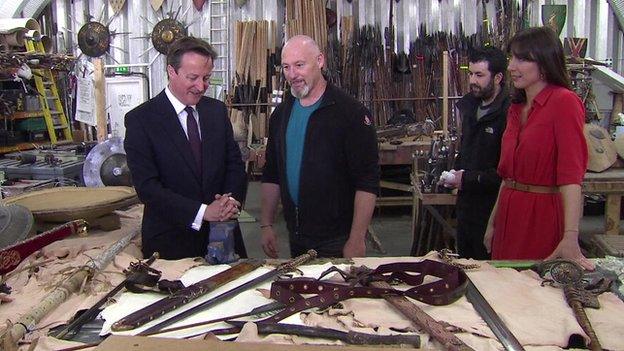
Before visiting the set of the Game of Thrones in Belfast
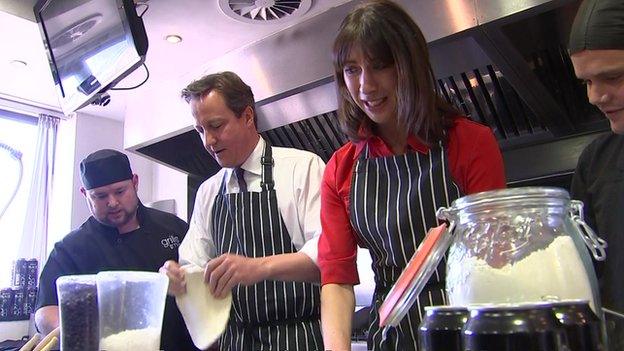
And donning aprons to prepare steak, ale and stilton pies in Cardiff
"The overall message from the Labour Party is that it wants the British people to trust it yet will not trust the British people to decide how they are governed."
Lib Dem leader Nick Clegg, who also opposes a referendum in 2017, said he agreed with Mr Blair, suggesting a future Conservative government would be beholden to Eurosceptics in his own party as well as UKIP.

Analysis by deputy political editor James Landale
"Former Labour prime minister backs Labour" is one of those news stories that falls into the "dog bites man" variety.
Important, perhaps, to the poor chap with a sore leg but hardly news for the rest of us. So why will we spend so much of today discussing Tony Blair's intervention in the election campaign? Read James' full blog to find out

"He (David Cameron) said it this morning: he wants to make a home for Nigel Farage in the Conservative Party.... Just imagine a Conservative Party leadership entirely in hock to Nigel Farage and (Eurosceptic Conservative) Peter Bone. It is an absolutely terrifying prospect."
And SNP leader Nicola Sturgeon said there should be "no possibility of Scotland being taken out of the European Union against our will".
Subscribe to the BBC Election 2015 newsletter, external to get a round-up of the day's campaign news sent to your inbox every weekday afternoon.
- Published6 April 2015
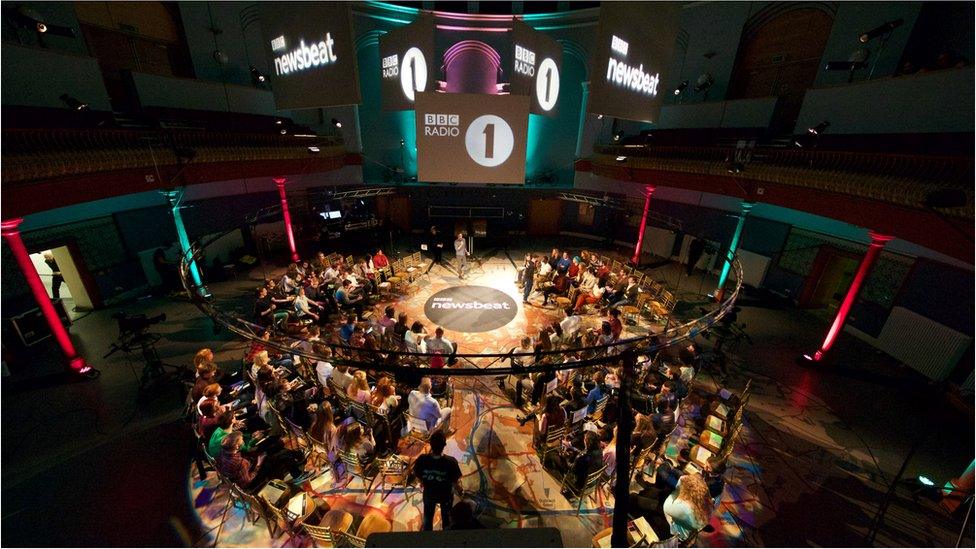
- Published7 April 2015
- Published7 April 2015
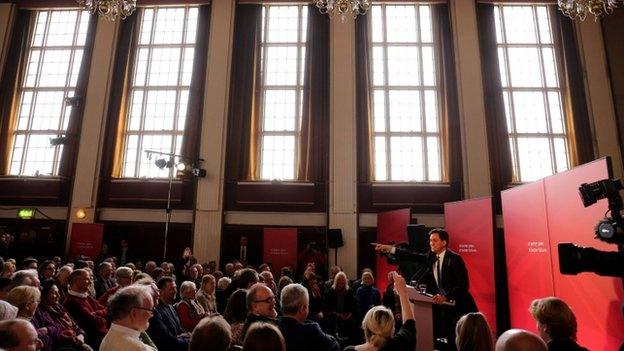
- Published7 April 2015

- Published6 April 2015
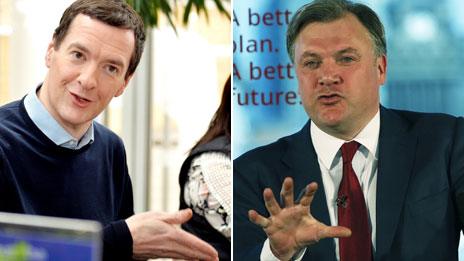
- Published6 April 2015
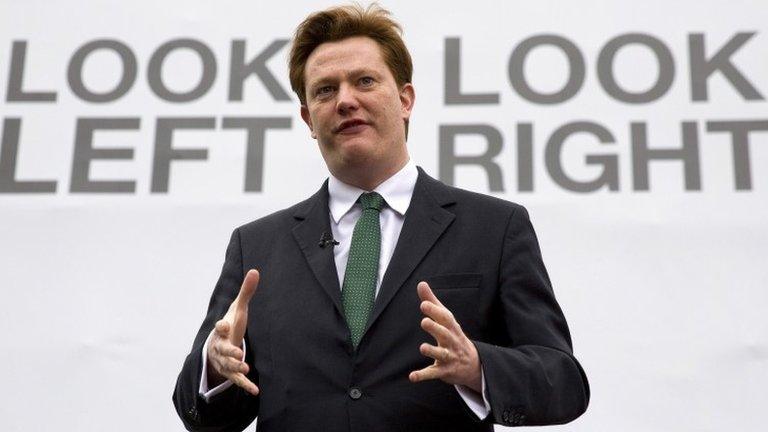
- Published31 December 2014
